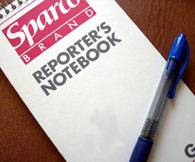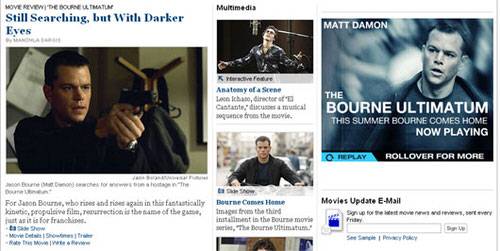Is there a new blogger scandal brewing? Allen Stern over at CenterNetworks seems to think so. Allen takes issue with the new video blog Webb Alert (which mentioned Read/WriteWeb today), saying that the blog doesn’t disclose its connection with advertising network Federated Media (which hosts it and sells advertising for it) and suspects that the whole thing may be an elaborate scheme to push traffic to FM clients (and notes that FM clients have been gushing over the show in return for the disproportionate links they get).

I honestly don’t think there’s any conspiracy here, but Allen’s post sheds light on a larger subject: the journalistic practice of disclosure. Blogging is still in its relative infancy and bloggers are still struggling to figure out when and how they should disclose potential conflicts of interest in an ongoing effort to gain legitimacy and garner respect from readers and other media producers.
The Ins and Outs of Disclosure
Disclosure is a tricky business and as a practice is still ill-defined even in the realm of traditional journalism. The general idea is that anything that might be seen as a potential conflict of interest between a writer and the subject of his story should be disclosed to the reader. If I invested in a startup I am writing about, for example, or if the CEO is my best friend, I should disclose that fact. But it’s not always so cut and dry.
Journalistic disclosure is something that the ombudsman at National Public Radio writes about a lot. In November of 2005, he published an interesting piece on the subject asking, “Do journalists have an obligation to disclose a personal, as well as a professional, connection to a source?” This is an instance when knowing when to disclose is not so clear. The NPR ombudsman talks about an episode when a disc jockey on the radio network mentions in passing a columnist from Slate magazine as a source, but fails to disclose that the columnist is also her husband.
Should she have disclosed that fact? The ombudsman concludes that the she should have, writing, “In this case, more disclosure would have been better than less. By finding another person to quote, the program would have avoided giving an impression of familial favoritism.” But what if the columnist in question had not been a family member, but a former co-worker? Or someone whom the radio DJ had interviewed in the past? Is disclosure still necessary? Or, what if the columnist and DJ had been romantically involved in the past but aren’t any longer? Does she need to discuss her sex life on air in the interest of journalistic integrity? You can see that it becomes quickly confusing, and at times overtly personal.
Sometimes I think bloggers take disclosures too far. Specifically, bloggers nearly universally seem to think that they must disclose advertising relationships when writing about companies that they run ads for (but then many paradoxically make specific posts thanking and praising those advertisers). We disclose advertiser relationships here at Read/WriteWeb, though you’ll notice that I didn’t disclose — until now — that Federated Media handles some of our advertising. This is something that I personally think borders on the absurd. Sure some people might be conflicted about biting the hand that feeds them, so to speak, and writing negatively about an advertiser. But journalism (which, let’s face it, is what many bloggers strive for) has long been an advertising supported medium, and the relationship between writers and advertisers is obvious to readers.
You’ll never see, for example, Brian Williams on the NBC Nightly News conclude a story about Ford Motor company by saying that Ford advertises on the NBC family of networks (which includes USA, Bravo, CNBC, MSNBC, etc.). The New York Times doesn’t stop to disclose that the movie they’re reviewing has a display ad in their Arts section. In fact, the screenshot below depicts the Times’ Arts web page today. Notice the review of the “Bourne Ultimatum” right next to an advert for the very same movie. The review was favorable, and didn’t include any disclosures, but I don’t think anyone thinks that the paper was shilling for ad dollars.

Further, as my NBC example may have illustrated, full disclosure can get even trickier for journalists in today’s landscape of media conglomerates. In a piece from three weeks ago in Slate about Rupert Murdoch’s then-impending purchase of Dow Jones, Jack Shafer wrote about what the full Wall Street Journal disclosure will look like when News Corp. assumes control of the newspaper. As Shafer said, it’s “almost as long as the Manhattan telephone book.”
“Presently, the Wall Street Journal doesn’t run a disclosure every time it cites a CNBC show or makes a passing mention of a publication or business that competes with Dow Jones. So there’s no obvious reason why a News Corp.-owned Journal would have to disclose its parent company’s holdings if it mentioned Facebook, a movie from Paramount Pictures, a book from Random House, a show on NBC, the New York Daily News, LexisNexis, ESPN, Comcast, the Dish Network, or any of the thousands of companies that directly compete with News Corp.
But common sense would dictate the inclusion of some sort of rider in full-fledged news stories about News Corp. competitors. My rough estimate indicates that upwards of a dozen News Corp. competitors make Journal-worthy news each day.”
When to Disclose
Disclosure is necessary, however, and at times I think that maybe it is the overzealous trend toward complete and utter transparency offered by bloggers that makes blogs so attractive to readers. So when should you disclose?
- Financial association — I don’t mean advertising, which is obvious, but less clear affiliations such as investments, ownership, or partial-ownership. For example, WIRED should mention they own Reddit when they write about the company. (Of course, you might not always even know when you’re investing in a company.)
- Employment — If you are paid by a company you are writing about as an employee, contractor, or consultant, you should disclose that.
- Competition — If you are writing specifically about a direct competitor to a company you are involved with in an aforementioned manner, especially if youÄôre writing in a negative way, it is probably best to disclose it. For example, WIRED should disclose that they own Reddit whenever they write about Digg.
- Personal involvement – This is by far the trickiest. As I illustrated before, personal or emotional involvement with stories can get complicated and, well, personal. I don’t think it always needs to be disclosed. For example, I don’t feel the need to disclose my political views whenever I write about politics. However, if I’m reviewing a company run by a close friend, I would disclose that fact or pass the story to a writer with less emotional involvement.
You’ll notice that I don’t include a rule about disclosing when you were paid to write about a specific topic or company. The reason is that any blogger who wants to be taken seriously as a journalist cannot and will not accept money or gifts from a source (or vice versa). That said, it should also be noted that there is a big difference between accepting gifts in exchange for writing a story and accepting review copies of goods for free. Last year a total non-scandal erupted when Microsoft handed out laptops loaded with Vista to select tech bloggers. These were not bribes or gifts or payments, as some people later called them — they were review copies of Vista that Microsoft (smartly) tried to make sure were loaded in an optimal machine before being reviewed. I used to work as an editor for an online computer game magazine and we never paid for the things we reviewed, and very often were sent pricey pieces of software or hardware that companies didn’t ask us to return. But we never disclosed that fact, or let the fact that we didn’t pay for our review copies influence our reviews.
In 2004 Nick Denton, owner of blog network Gawker Media, called for a code of ethics for bloggers to cover, among other ethical quagmires, the tricky and complicated maze that is disclosure.
“The guidelines would cover questions such as photo copyright, freebies, pay-to-post deals, editorial tie-ins, paid text links. They would be voluntary. But sites that adhered to them would be able to indicate that they met certain blog ethics standards.”
To my knowledge, nothing has ever been accomplished in this area. Earlier this year Tim O’Reilly began to draft a Blogger’s Code of Conduct, but curiously absent are ethical concerns like disclosure policy. Perhaps it is time to revive Denton’s idea?
Conclusion
As I said, blogging is still a very new medium and its evolution is just beginning. Bloggers are still figuring out by trial and error how to deal with things like disclosure. I’ll close by borrowing from Vaughn Ververs, writing last year for the CBS blog “Public Eye” about the topic of disclosure:
“The world can be pretty complicated, do simple disclosures on the part of journalists really do anything to clarify it? Who is to judge what type of disclosure is germane to a story? If itÄôs an example of, you-know-it-when-you-see-it, isnÄôt it just one more judgment call that is open to everyoneÄôs individual interpretation?”
What sort of disclosures do you think are necessary for bloggers? Do bloggers go overboard? Or do they not disclose enough? Leave your thoughts in the comments below.
(Full disclosure: I was talking to Allen Stern on instant messenger when I first starting writing this piece. ;))

















